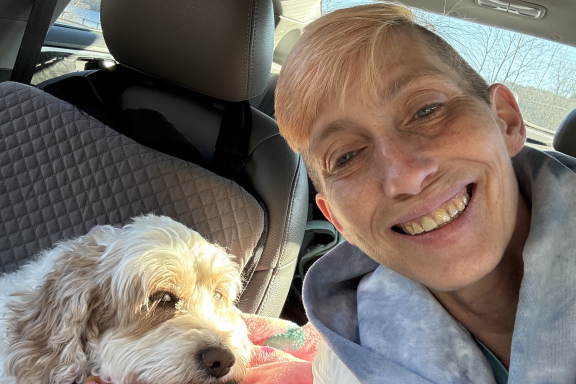Heidi says her story changes a bit each time she shares it, and she sees these changes as a reflection of her ongoing growth and healing. The foundation of her story, however, remains the same – how the ramifications of childhood sexual abuse led to years in and out of psychiatric hospitals. She reflects on how self-harm, eating disorders, and dissociation were the only ways she knew to cope. She was given one label and diagnosis after another until it felt like she was only a diagnosis and not a human being. She was a high-risk patient, blacklisted from programs and institutions, and left without hope of healing.
Internalizing Negative Messages
“For too long, my understanding of myself was defined by a multitude of clinical charts, diagnoses, and medications collected over the decades. I was told so many times that I was a waste of time and resources,” she says.
It was no surprise that Heidi began to internalize these messages. “I felt completely worthless. I lost my sense of being as a person. I had lost the ability to have hope and belief in myself.”
Finding Her Voice
In 2006, Heidi believed she was out of options for receiving mental health support in the community. It was then that she was introduced to Advocates. She went to live at an Advocates group home featuring an intense, two-year program. While part of this program, Heidi met and formed connections with others who understood her challenges. Her providers viewed her as a person, not as a diagnosis. In doing so, they supported her in unlearning many of the messages she had internalized about herself and her worth. “Slowly, I learned that I had a voice, and that people genuinely wanted to hear what I wanted in my life and what I did and did not find helpful in treatment,” recalls Heidi.
With encouragement from Advocates staff, Heidi began to see her own strengths. Her self-confidence grew, and she learned to articulate how she felt and what she needed. After completing the program, Heidi went on to become a certified peer specialist at Advocates.
Healing Isn’t Linear
Even as she achieved personal and professional goals, Heidi recognized that her healing journey was ongoing. “I still had more work to do. I had to understand how experiencing pervasive trauma had impacted me. For a long time, I think I believed that if I just kept pushing myself forward, those reminders of my trauma, my increasing nightmares and flashbacks, and my increased restricting of food intake would just go away,” she says.
“But the thing about healing is that it’s not linear. I view my healing as an ongoing journey. When I share my story with others, I explain why I personally don’t find the term ‘recovery’ helpful. For me, there is no ‘before’ I was sexually abused as a child, and I cannot ‘go back’ to being who I was – but I can continue on my healing journey. There will always be more for me to learn about myself and how I navigate life’s challenges,” she shares.
Focusing on Herself
Years into her work as a certified peer specialist, Heidi had to take a leave of absence. She left Advocates for a few years to focus on her own healing journey. “It was a good wake-up call. I’ve had to accept that healing is a continuous process of learning about myself. I don’t see it as a beginning point and an end point. There really is no endpoint. I just need to know that I am on my own path,” she says.
Today, Heidi uses journaling and writing poetry to express her feelings. She also enjoys spending time outside with her dog, Bella, and she’s discovered that running is how she can feel strong and free. Heidi now tries to take time each day to focus on what helps her feel content and peaceful even amidst daily challenges. “I’ve learned how helpful it is to take the time to just feel fresh air on my face and snuggle my dog and take in what life is all about—loving myself and others the best I can,” she says.
